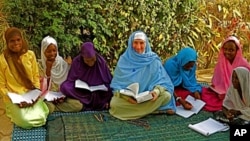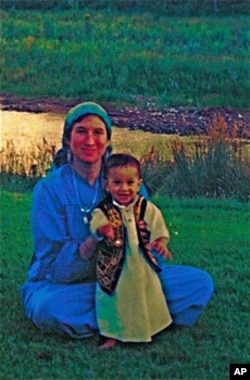For many people, the word 'Islam' conjures up images of violence, suicide bombings and holy war. But not for Maryam Kabeer Faye, a Jewish-born American. She believes the religion she adopted after a long spiritual journey represents peace, love and mercy.
Kabeer Faye describes her transformative experience, from her Jewish roots to Sufi Islam, in her recent book, "Journey through Ten Thousand Veils:the Alchemy of Transformation on the Sufi Path."
Search for answers
As far back as she can remember, Maryam Kabeer Faye yearned for spiritual fulfillment.
She was born in 1946 to a liberal Jewish family in Hollywood, California. While her parents were kind and loving, they were not religious, which left Kabeer Faye with a spiritual void.
At the age of 12, she was given a painted scroll of an ancient man with the words, "Seek and the truth shall make you free." That message resonated with her as she grew up in the tumultuous political climate of the 1960s.
At 16, she enrolled at the University of California, Berkeley, then a hotbed of social and political activism. While there, she studied the teachings of the Koran, the scriptures of Advaita Vedanta - a form of Hindu philosophy - and the poetry of 13th century philosopher Jelaluddin Rumi.
Spiritual quest
She left Berkeley after just two years, to begin a spiritual quest to find what she calls her "truth."
"It was not any particular religion that I was seeking or that I knew about," says Kabeer Faye. "I was seeking that liberating truth, wherever the call was coming from."
The call led her to places far beyond America's shores, including Africa, Asia, Europe and the Middle East. It was on a bus trip through an Afghan desert that she first encountered the faith that would come to define her spiritualism.
"The bus went into the middle of the desert and at a certain moment the call to prayer came just lilting through the desert - first time I've ever heard it - and then the bus stopped and all of those colorful people got off the bus," she remembers. "Everyone had their prayer mats and they laid them out in the desert and prayed. [It was the] first time that I saw people praying in that way. And it was so pure and beautiful and truly inviting."
Kabeer Faye had witnessed what all devout, practicing Muslims do five times a day. They set aside other activities, face in the direction of the Muslim holy city of Mecca, and kneel down in worship.
The experience was a call that she eventually answered.
Finding her religion
"Countless, countless moments of awakening led me ultimately to the path of Islam, and within that, to the practice of Sufism, or Tasawuf, which for me is intricately united with Islam," explains Kabeer Faye.
Sufism arose as an organized movement after the death of Muhammad, the central prophet of the Islamic faith. Many consider it a mystical form of Islam.
"It's kind of the interior illumination of the practices of Islam, which bring out the best in it. That is the love, the mercy, the kindness, wisdom, light," says Kabeer Faye. "And so that was the destiny that was marked for me, that was decreed for me."
She studied and travelled with Sufi masters in Israel, Sri Lanka, Senegal and Gambia, as well as closer to home in Pennsylvania and South Carolina, in order to deepen her understanding of this particular form of Islam.
"The experience I've had [is] not with the abstract study of Sufism in books - because we can always read about Sufism in the 12th century - but in my case, my destiny was to be guided from one Sufi master to the next, until my present teacher, who is Sheikh Harun Rashid Faye from Senegal, West Africa."
It is from this teacher that Maryam Kabeer took her last name.
Changing perceptions
Kabeer Faye acknowledges that while many believe Islam is a violent religion, the Islam she knows and embraces is a religion of mercy and compassion.
"I can't count the numbers of people I met who were the most generous, kind, and giving, loving, caring people," she says. "That is, caring for the orphan, caring for the disadvantaged, caring for women, caring for me. How did I become a Muslim? It's by that love. How would I transmit it to anyone else? Through that love."
Those who espouse violence in the name of Islam, says Kabeer Faye, have distorted the true faith.
"I learned by studying, that suicide is forbidden in Islam, and killing of innocents is forbidden in Islam, and even cutting down trees in a defensive battle is forbidden. So life is supported by Islam. Therefore oppression and aggression are forbidden, whereas mercy, tolerance, kindness and charity are commanded."
New journey
Born Jewish but now a Sufi Muslim, Maryam Kabeer Faye lives in Philadelphia with her grown son, Issa. Her home is a center of teaching and place of refuge for spiritual travelers.
In addition to attending conferences and workshops, Kabeer Faye teaches Arabic and Islamic studies to women and girls in the U.S. and in Gambia, as well.
And, once a week, she visits women in prison to counsel and guide them, and teaches them Islamic Studies.
Now that her first journey of spiritual learning is complete, she has embarked on a second journey as an author and teacher to share the knowledge she's acquired during a lifetime of experiences with Muslims and non-Muslims alike.



